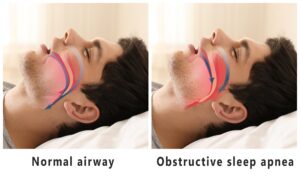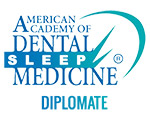 Many people associate sleep apnea with chronic snoring. Although snoring is a common symptom of the breathing disorder, it’s the least of your concerns if you have sleep apnea. Believe it or not, you can experience potentially deadly complications with no treatment. Here’s why you should seek treatment for sleep apnea right away.
Many people associate sleep apnea with chronic snoring. Although snoring is a common symptom of the breathing disorder, it’s the least of your concerns if you have sleep apnea. Believe it or not, you can experience potentially deadly complications with no treatment. Here’s why you should seek treatment for sleep apnea right away.
What is Sleep Apnea?
Obstructive sleep apnea (OSA) is the more prevalent form of the condition. It causes frequent breathing disruptions from an obstruction in the upper airway caused by the tissues in the back of the mouth or the tongue collapsing. Each pause in breathing can last for a minute or longer. Each event depletes your body of oxygen and interrupts your sleep cycle.
Risks of Untreated Sleep Apnea
Everytime you stop breathing, your brain will jolt you awake to inhale. You may wake up choking or gasping for air. You may not even be aware of the brief awakenings, but your sleep cycle will be affected. Initially, you may experience daytime fatigue. Over time, sleep deprivation can occur. Your cognitive abilities can decline, which is dangerous when driving or operating heavy machinery. Sleep deprivation increases your risk of drowsy driving, which can result in auto accidents.
Every time you are deprived of oxygen, it strains every system in your body, including your heart. Untreated sleep apnea is linked to an increased risk of cardiovascular disease, including heart attacks and strokes.
You can also be at risk of diabetes, obesity, and many other factors that are known to shorten your lifespan. Sleep apnea can also increase your risk of depression, mood changes, anxiety, and memory loss.
Options to Treat Sleep Apnea
You have multiple options to treat sleep apnea. Your sleep specialist will create a personalized treatment plan, which may include:
- CPAP: A CPAP machine delivers air through a mask worn over the mouth or nose to stop breathing interruptions. It is effective, but it can be bothersome for some patients.
- Oral Appliance: An oral appliance is a custom-fit device that moves your tongue and jaw into a more comfortable position. It is effective in treating mild-to-moderate obstructive sleep apnea. It can be used alone or along with a CPAP.
Don’t spend another night putting your health at risk. Your sleep specialist can keep your airway open to help you breathe better. You’ll get the rest you need to promote your overall physical and mental wellness.
About Dr. Donald Marks
Dr. Marks earned his dental degree at the University of Pittsburgh School of Dental Medicine and has regularly continued his education in various specialties, including sleep apnea. He has the personalized solutions you need to sleep and breathe better. Request an appointment through his website or call his office at (814) 826-3776.




